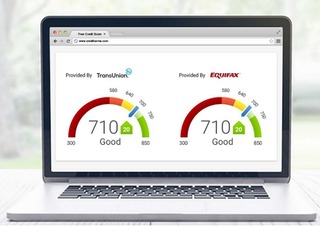
Credit Karma makes money through personalized recommendations it offers to its users

I really should find out what my credit score is, but I'm also not really happy about having to pay for that information. It just seems kind of sleazy, and scammy, for someone to want to charge me for that.
That is why I should go to Credit Karma, since it offers a credit score and credit report online, for free. The company says that it "will never ask you for your credit card number during the registration process or at any other time."
How does it get away with not charging customers, and still remain a viable business? Through another source of revenue: advertising.
That does mean traditional display advertising, but through personalized recommendations that it makes to each user.
Here is how the company describes it on its website:
"Simply put, we do generate revenue through advertising partners, but it may not be the kind of advertising you imagine. Rather, our goal is to provide personalized offers that we think might be helpful to you based on your current credit situation," Credit Karma wrote.
"Credit Karma recommendations are based on powerful algorithms that find products based on your credit profile. These offers may include refinancing options if you look like you might be overpaying for a loan, or credit cards that could help you optimize your savings and earnings (just to name a few)."
Given how those recommendations are based on each individual's particular needs and profile, Credit Karma believe it is in a unique position to connect individuals with the right services for them.
"We want the credit products our members see on the website to be interesting, relevant and something they may qualify for. Subsequently, members can have much better approval chances than applying cold and banks are left turning down fewer applications," Greg Lull, Head of Consumer Insights at Credit Karma, wrote in a blog post.
"It sets up a business model for us predicated on the success of both our members and business partners. We get paid when we give our members the most benefit."
The company's partners include, "most of the largest national banks, credit card providers and financial institutions are Credit Karma members and we hope to gradually extend our reach to a regional and local level too," a company spokesperson told me.
However, the company would not go into more detail about how exactly the recommendations work; whether Credit Karma gets paid per recommendation, or per action, say if the user actually signs up for that credit card or opening an account with the bank.
"How Credit Karma gets paid depends on the partner, and the specific arrangement," the company spokesperson told me.
Founded in 2007, Credit Karma offers many of the same features that other services offer, such as bill reminders, alerts, personalized debt management recommendations, and spending breakdowns to show users where their money is going. The site also offers a comparison feature that lets users compare interest rates on their credit cards and loans of all types.
But the major difference between Credit Karma and other personal finance tools is its focus on credit ratings. Credit Karma says that it offers users a more complete picture of their credit, which is missing from a lot of other personal finance sites.
It's raised $368.5 million in funding, including a $175 million round earlier this week, which valued the company at $3.5 billion,
Investors in the company include Google Capital Susquehanna Growth Equity Ribbit Capital, Felicis Ventures, QED Investors, Founders Fund SV Angel, Tiger Global Management, Valinor Management and Viking Global Investors.
(Image source: creditkarma.com)
Related News


Personal finance platform Credit Karma raises $75M

Credit Karma bags $85M for free credit monitoring

